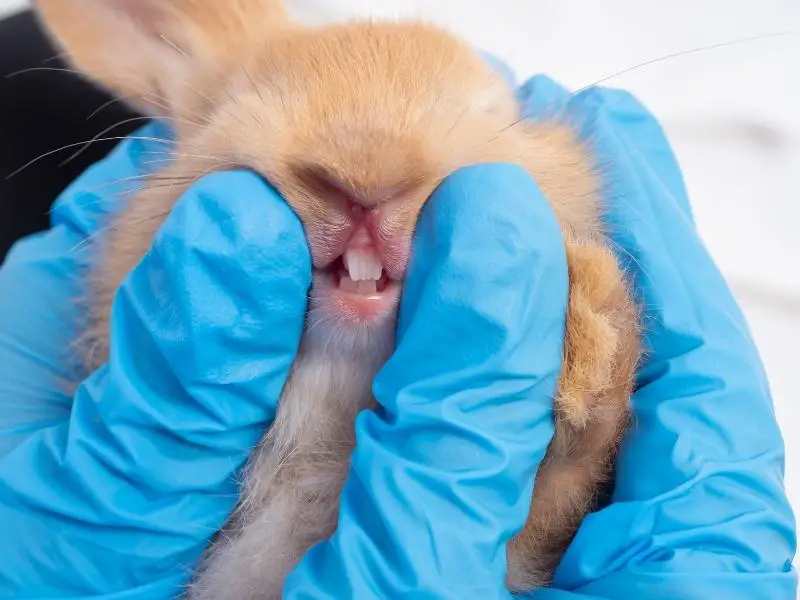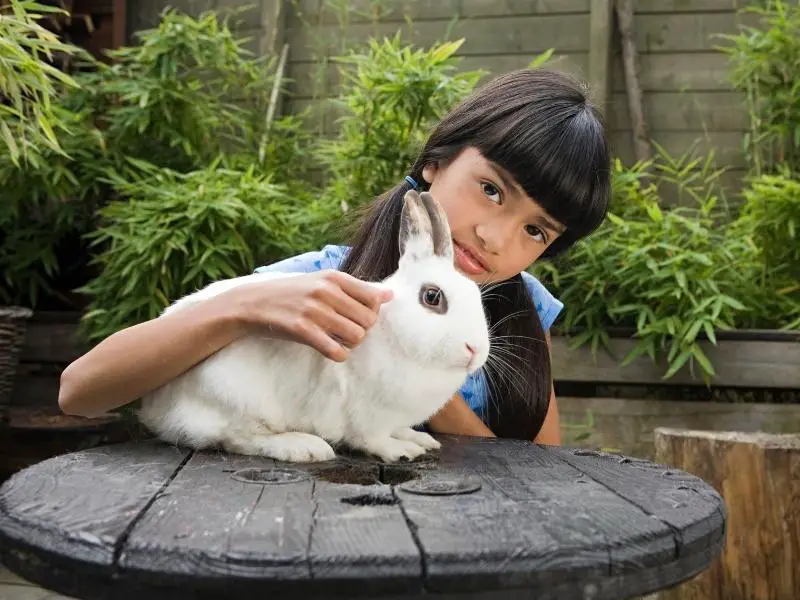Nothing is worse than coming home to find your sweet bun that has used your favorite armchair as a chew toy. Your first reaction might be to express your disappointment, but maybe there is a reason why your rabbit is chewing so much.
Do rabbit teeth keep growing?
Rabbit teeth grow continuously throughout their lives. They have teeth that are open-rooted, which can grow between 3 and 5 inches a year. A rabbit’s tooth socket remains open, which allows the teeth to continue growing. Chewing and eating hay helps wear their teeth down.
If you want to learn more about why rabbit teeth don’t stop growing, this detailed guide will provide you with all the information you’ll need.
Why Don’t My Rabbit’s Teeth Stop Growing?
Rabbits have open-rooted teeth, which means their teeth grow continuously. If your bun didn’t have open-rooted teeth, their teeth would be worn down very fast due to the amount of chewing and gnawing they do.
Your bun is a herbivore (they eat plant material), and they’re also grazers. This means they continuously nibble throughout the day, and hay is their primary food source. For a rabbit’s digestive system to work correctly, they need to have a constant source of hay.
Wild rabbits also have open-rooted teeth as their diet consists of tree bark, hay, small twigs, and other leafy greens. Let’s take a look at some other animals that have open-rooted teeth:
- Guinea pigs
- Rats (their incisors are open-rooted)
- Chinchillas
When Do Rabbits’ Teeth Stop Growing?
Your rabbit’s teeth will never stop growing as they have an open-rooted dental structure, and their diet suits this.
Your bun is born without teeth. They develop 16 milk teeth around 19 to 21 days old.
These teeth are then replaced with 28 permanent teeth once they become adults. Here’s a look at your buns tooth structure:
- 4 main incisors (big teeth at the top and bottom).
- 2 peg teeth (next to the incisors at the top).
- 22 cheek teeth (molars and premolars located at the back). Each side has 6 teeth on the top and 5 on the bottom. These teeth grind the food.
A rabbit’s skull had to evolve to compensate for its herbivore diet. Unlike canines with fang-like teeth to tear meat, a rabbit has open-rooted teeth to chew plant material.
Each of your rabbit’s teeth is open-rooted, which means they’ll continue to grow throughout your bun’s lifespan and will never wear down completely.
Do Rabbit Teeth Need to Be Trimmed?
Providing your bun with food that encourages chewing and gnawing will help them wear down their teeth naturally. A rabbit’s teeth are coated in dentin (softer and weaker than enamel). When your bun chews on things, it allows the teeth to wear down quickly.
Unfortunately, this also means that rabbits are prone to cracks or chips in their teeth, which can lead to dental infections. If the food you give to your bun is too soft, their teeth won’t wear down and will continue to grow.
As a bunny owner, you will need to take your bun to the vet or a trained professional to have their teeth trimmed (if they’re overgrown).
This should never be done at home. Using incorrect equipment with a lack of experience can lead to tooth fractures, which will cause infection (and can lead to death).
How Often Do Rabbits Need Their Teeth Trimmed?

If you provide your bun with the correct diet and rabbit-friendly toys to chew on, you shouldn’t need to get your teeth trimmed. The natural teeth-grinding that comes from chewing should wear their teeth done sufficiently.
However, if your bun has overgrown teeth (malocclusions), you will need professional assistance. Watch out for these signs and symptoms of overgrown teeth:
- Drooling excessively (hypersalivation)
- Struggling to chew and swallow
- Weight loss
- Loud grinding of teeth
- Foul mouth odor
- Lumps by the ears or under the eyes as a result of the teeth pushing up toward the tear ducts
- Skew front teeth
You need to know that if you have to get your buns’ teeth trimmed, you may have to take them back every 2 to 6 months to get them retrimmed. It takes time for their teeth to realign correctly.
How to Deal With Overgrown Rabbit Teeth?
If your bun suffers from overgrown teeth, it must receive veterinary assistance and care. It’s not advised to try and trim their teeth at home, as this can be dangerous for your rabbit.
Follow these easy steps on how to deal with overgrown rabbit teeth:
1. Seek Veterinary Care
The first step is to take your floppy-eared friend to the vet. The vet will do an X-ray to check the extent of the overgrown teeth. If only the incisors are overgrown, they will trim them using special equipment.
If your bun’s molars are elongated, they’ll need to be put under anesthesia and undergo trimming. If the area is infected, you may have to wait a couple of weeks for the infection to clear before the vet can operate.
2. Modify Your Rabbit’s Diet
If your rabbit’s teeth are overgrown, it can be uncomfortable for them to eat properly. If your bun has had tooth-trimming, they will also need their diet modified as their teeth will be sensitive and sore after the procedure. You can help your bun by:
- Softening their pellets with a small amount of warm water to make it easier to chew and swallow
- Tearing up fruit, vegetables, and leafy greens into smaller pieces
- Breaking up the hay into smaller sections to make it easier to chew
3. Administer Antibiotics
If your vet has prescribed antibiotics, you must ensure your bun completes the course. This will clear up any infections, whether you’re waiting for surgery or after the procedure has been done.
My Last Bunny Thoughts
Unlike cats and dogs, your bun must keep its teeth worn down by chewing to prevent dental issues and infections. As a rabbit owner, you’ll need to keep a close eye on your bunny’s teeth and dental health, as their teeth will continue to grow throughout their life.
Providing your bun with plenty of hay and toys to chew on is a great way to keep their teeth short. The act of chewing also keeps them entertained.
Unfortunately, your vet may have to remove the overgrown teeth if your floppy-eared friends’ teeth keep growing and they don’t get worn down naturally or professionally trimmed.
Prevention is always better than cure, and you want to prevent excessive rabbit teeth growth.
Related Articles:

